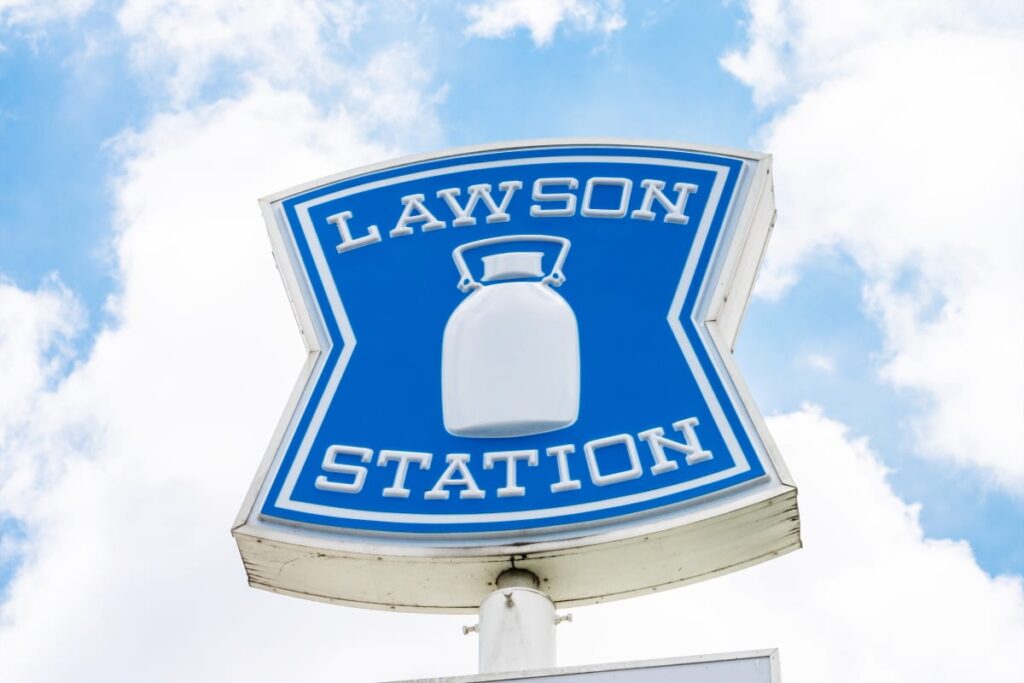[ad_1]
Japanese convenience store chain Lawson has become a popular stop for a quick meal or snack. First coming to Japan in 1975, the convenience store with its signature blue-and-white logo now has locations in every prefecture.
Although the Lawson brand originated in Ohio, USA in 1939, it is today much more recognizable as a Japanese staple. Best-selling Lawson products include its decadent Uchi Cafe pastry line and its Karaage-Kun chicken bites. Karaage-Kun comes in flavors ranging from salty to spicy to cheese-filled.
Since 2012, Lawson has also announced an increased focus on sustainability and environmental protection efforts. Lawson’s sustainability initiative features a three-pronged approach known as ESG, short for Environment, Society, and Governance. Lawson’s management plans to focus on remodeling individual stores, instating “sweeping changes” to company policy, and partnering with and donating money to various causes including reforestation, scholarships for children of single parents, and, most recently, a Ukraine relief fund.
One major element of the company’s new sustainability plan is the creation of “Green Lawson,” environmentally friendly stores. The first “Green Lawson” locations have opened in Kanagawa Prefecture and the Tokyo metropolitan area. The company plans to roll out more locations around the country in the coming years. [1]
What’s In a “Green Lawson?”
A “Green Lawson” sustainable location features a number of differences compared to a standard Lawson convenience store. The sections of the store selling refrigerated food now have doors to reduce energy consumption. Lawson’s “Machi Cafe” line of self-serve coffee drinks is served in paper cups, rather than plastic. The roof of each store is outfitted with solar panels as an alternative power source. The Green Lawson stores sell more hot, ready-made food made in-store and fewer pre-packaged goods. Some Green Lawson stores even utilize digital “avatar employees” – virtual cashiers and assistants staffed by work-from-home employees to allow for greater social distancing.
The “Green Lawson” initiative began with a “model store” introduced on the campus of Keio University in Fujisawa City, Kanagawa Prefecture in September 2019. The model store featured multiple planned sustainability changes in order to model the future of an “ideal Lawson store.” It was the first convenience store in Japan to receive a five-star rating according to the Building Energy-Efficiency Labeling System (BELS).
At the same time, Lawson rolled out other sustainability initiatives throughout Japan. Since 2019, Lawson has begun using electric vehicles (EVs) as company cars. Some stores have also been outfitted with refrigeration systems that do not utilize chlorofluorocarbons (CFC), as CFCs are known to contribute to climate change and long-term environmental damage.[2]
Lawson’s Long-Term Goals

In 2019, Lawson introduced the “Blue Challenge 2050,” an environmental initiative with the goal of reducing the company’s energy use and harmful emissions. The stated goal of the Blue Challenge is to halve the company’s carbon dioxide (CO2) emissions by 2030 (using the company’s 2013 emission levels as a baseline) and reduce them by 100% by 2050. [3] In a report published by Lawson during the first half of 2022, the company stated that it was on track to reach this goal, with CO2 emissions in 2022 approximately 15% lower than in 2017, five years prior.
Lawson also intends to revamp their lineup of products with the goal of eliminating waste. Convenience stores in Japan are known to be a major source of plastic waste, as they sell a high number of single-serve pastries, snacks, and dinners.
In order to reduce waste, Lawson will streamline their cooking process and allow customers to order food in advance using their smartphones. They will decrease the number of refrigerated products for sale and replace removed products with frozen alternatives, as frozen foods generally have a longer shelf life. As much plastic packaging as possible will be replaced with paper or other biodegradable alternatives.[4]
According to the 2022 report, Lawson’s ultimate goal is to remodel 3,500 of its stores across Japan to follow this more eco-friendly business model. These stores will partner with their local communities to establish energy-efficient systems such as online ordering with delivery or in-store pickup options.
These Lawson locations will also endeavor to provide a greater range of services to people in their local community, such as more Lawson Bank ATM locations and the ongoing ability to purchase event tickets within Lawson locations.
Other Companies Will Follow Lawson’s Lead
Recently, other Japan-based convenience stores have begun to introduce similar eco-friendly initiatives, although not on as grand a scale as Lawson.
In 2021, Family Mart, another popular convenience store chain, introduced a new line of musubi rice balls in eco-friendly packaging. The sustainable rice balls are currently available in four flavors – salmon, tuna with mayonnaise, chicken with burdock root, and mentaiko (spicy pollack roe). Currently, Family Mart is phasing out plastic forks in favor of wooden chopsticks handed out with their bento lunch boxes and hot meals. It’s also introduced paper-based bowls for its take-home pasta dishes.[5]
With Lawson at the forefront of the movement, it seems likely that convenience stores and sustainability could go hand-in-hand moving toward the future. Lawson’s goals for 2030 and 2050 are ambitious. But the continuing effort to open eco-friendly Green Lawson stores represents a major step towards achieving them.
Sources
[1] Lawson. “Lawson Integrated Report 2022.” 2022. Link.
[2] Lawson. “Managing Stores to Save Energy.” Link.
[3] Lawson. “特集:環境ビジョン LawsonBlueChallenge 2050! 2050年 食品ロス・CO2・プラスチックを減らすローソンの取り組み” Link.
[4] Yomiuri Shimbun. “Convenience store chain to open eco-friendly outlets.” 4 January 2022. Link.
[5] Imada, Kaila. “FamilyMart’s new musubi rice balls will come in eco-friendly wrapping.” Timeout Tokyo News. 10 August 2021. Link.
[ad_2]
Source link


